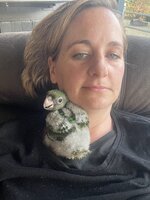TeenyCalla
New member
- Jul 10, 2023
- 4
- 0
- Parrots
- 2 cockatiels
Hi everyone
My black winged Jardine baby is 6 weeks old and is showing signs of wanting to eat other foods (I say this because s/he uses their beak the way they do when they eat seed… hope that makes sense.)
My question is, when can I start introducing other foods to baby’s diet. I would obviously still mash the food (example I would cook and mash sweet potatoe and hand feed).
Thank you 😊
My black winged Jardine baby is 6 weeks old and is showing signs of wanting to eat other foods (I say this because s/he uses their beak the way they do when they eat seed… hope that makes sense.)
My question is, when can I start introducing other foods to baby’s diet. I would obviously still mash the food (example I would cook and mash sweet potatoe and hand feed).
Thank you 😊
